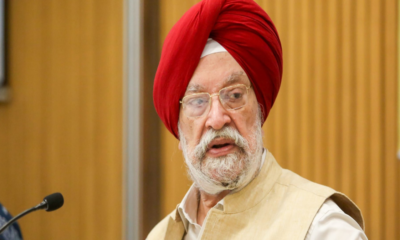[vc_row][vc_column][vc_column_text]Nominees of Hardik Patel-led Patidar Anamat Andolan Samiti (PAAS) hold late night talks with Congress delegation led by Kapil Sibal on reservation for Patels
With barely a month left before the first phase of polling for the 182-member Gujarat Assembly, the Congress party is literally burning the midnight oil to finalise its alliance with Hardik Patel’s Patidar Anamat Andolan Samiti (PAAS) in a bid to secure their endorsement for its bid at power.
Late on Wednesday night, a Congress delegation led by senior party leader Kapil Sibal held talks with PAAS representatives – though Hardik Patel chose to skip the meet – to discuss their demand for carving out a reservation policy that would enable the state’s politically crucial 18 percent Patidar/Patel population to seek government jobs and seats in educational institutions under a clearly defined quota.
The meeting that began shortly after 11.30 pm on Wednesday night in Ahmedabad continued almost till 2 am on Thursday. At the end of the deliberations, PAAS leaders claimed that the Congress had laid out before them three options through which the sticky issue of carving out the reservation – beyond the existing Supreme Court mandated cap of a total of 49 per cent – can be resolved.
Hardik Patel had made it clear to the Congress leadership that an endorsement from him and the PAAS for the party’s election campaign in Gujarat will come only after the grand old party clearly lays out its plan on how it would bypass the 49 per cent cap for reservations to grant a new quota that will largely benefit the Patidar community.
“We have been given three options by the Congress party on how to provide reservation to our community in educational institutions and government jobs,” PAAS convener Dinesh Bambhania said after the meeting.
Though the details of the options laid out by the Congress are being kept a secret, Bambhania said that the PAAS leaders will “discuss these with Hardik Patel, social leaders of the community, legal experts and then place them before our community.” The PAAS convener said that if any of the options listed by the Congress is found legally tenable and is also accepted by the Patidar community, then talks with the Congress over backing it in the upcoming elections will continue.
“The Congress proposal has not touched 49 per cent reservations for Scheduled Castes, Scheduled Tribes and Other Backward Classes which exists in the state. The options that have been given are over and above it,” Bambhania said, while adding that an earlier offer made by the party of carving out a quota “under the Economically Backward Class” category has been rejected by PAAS “as it is not constitutionally valid”.
Congress leader Kapil Sibal who led the talks from his party’s end expressed hope that the discussions will lead to a positive outcome soon and added: “we have discussed all the aspects and will do all the things (to provide reservation to the Patidar community) as per the Constitution.”
Another meeting between the Congress and PAAS leaders, Sibal said, would be convened over the next 2-3 days to take the talks forward.
The polling for the two-phase Gujarat elections will take place on December 9 and 14 and votes will be counted on December 18.
Promising Hardik Patel and his PAAS comrades a reservation for Patidars in Gujarat will not be an easy choice for the Congress as in doing so the party risks alienating backwards castes, Dalits and adivasis who currently enjoy benefits of reservation and could see such a commitment as one that impinges on their constitutionally mandated right. This is why the Congress and even the PAAS leaders have made it clear that the Patidar reservation formula must leave the existing reservation system in the state untouched.
In Gujarat, OBCs comprise 146 castes and make up around 40 per cent of the state’s population. They have a 27 per cent quota in government jobs and education. The scheduled castes are entitled to a 7 per cent quota while the 15 per cent has been reserved for scheduled tribes. This makes a total of 49 per cent reserved seats in the state which is just under the 50 per cent reservation cap set by the Supreme Court.
The Congress has roped in OBC leader Alpesh Thakore within its ranks while popular Dalit leader from the state, Jignesh Mevani has assured Congress vice president Rahul Gandhi that he will ask his supporters to “not vote for the BJP” in the largely bi-polar state. If the Congress also manages to get Hardik’s endorsement during the upcoming election, it hopes that its 22-year-long exile from the seat of power in the BJP ruled state could come to an end.[/vc_column_text][/vc_column][/vc_row]


 Latest world news11 hours ago
Latest world news11 hours ago
 Latest world news11 hours ago
Latest world news11 hours ago
 India News11 hours ago
India News11 hours ago
 Latest world news10 hours ago
Latest world news10 hours ago
 India News10 hours ago
India News10 hours ago













